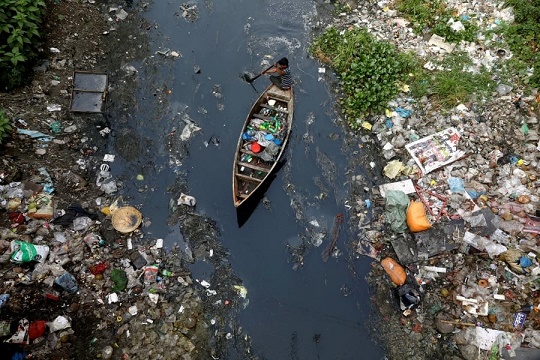-20 years for plastic bags to convert into the soil; Plastic cups 50 years; Plastic bottles 450 years.
The country's rivers and canals have become the museum of plastic waste. Rivers, canals, the bottom of the Beal are being filled with non-biodegradable waste. The flow of canals, sewage lines is being stopped. Banned polythene and plastic waste are also playing a role in occupying the banks of rivers and canals.
15-20 years old polythene is found by digging the soil on the banks of the river. It reduces the fertility of the soil. Water is getting polluted. At one stage, this plastic becomes powder and enters the body of humans and other animals through the food chain and causing various deadly diseases including cancer. The economic loss of pollution is noteworthy.
Even after the ban of polythene by law, its production and consumption is increasing surprisingly. At present, more than 8 lakh 21 thousand tons of plastic waste is generated annually in the country. 40% of it is recycled but 60% is spread in the environment.
According to experts, polythene shopping bags were banned in the country in 2002. However, single-use polythene has not been banned. Taking advantage of this loophole in the law, the use of various types of polythene and plastic is increasing. Meanwhile, according to the Environmental Protection Act, the production, import, marketing, sale and display for sale, storage and distribution of all types of shopping bags made of polythene has not stopped. Polythene shopping bags are being sold in the markets under the nose of the administration. A new polythene factory is being built.
According to the information, at present, more than 1500 factories are producing polyethylene in the country, most of which are based in Dhaka. According to the information of the Ministry of Environment and Forests, 8 lakh 21 thousand 250 tons of plastic waste is generated annually in the country. 40 percent of it is recycled or reused. The rest is in the environment. Only in Dhaka city, about two and a half lakh tons of plastic waste is produced annually, which is more than 30 percent of the plastic waste produced in the whole country. According to government data, people across the country generate 9 to 10 kg of plastic waste per capita annually. Per capita plastic waste generation in the capital ranges from 18 to 22 kg. And a large part of this plastic and polythene ends up in rivers and various water bodies.
A study published in ResearchGate, a network of researchers based in Berlin, Germany, says that about 1-3 billion micro plastics enter the Bay of Bengal every year through the Ganga, Brahmaputra and Meghna rivers. Another study showed the amount of oxygen in Buriganga is less than 1 ml. grams per liter in where 5 ml grams per liter required for fish and humans.
According to a joint study by the Department of Environment and Waste Concern, only 36 per cent of plastic is recycled, 39 per cent goes to landfills and the remaining 25 per cent ends up in the Bay of Bengal through waste rivers. According to the research report of National Geographic, about 300 types of plastic products fall into the Bay of Bengal through the Padma River. Plastic waste is also coming from neighboring countries.
According to a report by Environment and Social Development Organization - ESDO, Bangladesh produces about 3 thousand tons of plastic waste every day, there about 73 thousand tons of plastic waste is falling into the Bay of Bengal every day through Padma, Meghna and Yamuna rivers. 70 thousand tons of plastic waste is coming from China, India, Nepal, Myanmar and Bhutan through 57 Tran’s boundary rivers every day. Worryingly, micro plastics have been found in the stomachs and salt of fish in the Bay of Bengal, posing a serious threat to human health as well as animal health.
In 2021, a study by the Environmental Science Department of Jahangirnagar University found an average of 2,676 micro plastics per kg of salt. According to the data published by the World Bank in 2020, Ganga, Padma, Yamuna are jointly identified as the second most polluted basins in the world in terms of plastic pollution. Earlier in 2018, Buriganga was listed as one of the most polluted rivers in the world by the Asian Development Bank and UNEP.
Last year, a private company dug up the riverside soil around Dhaka and found half a kilogram to one and a half kilograms of plastic per ton of soil. Among them was 15-year-old plastic. During dredging of Karnaphuli river in 2018, 4.8 million cubic meters of soil was excavated, of which 2.2 million cubic meters was polythene sand. In 2012-13, the government took steps to remove waste from the rivers around Dhaka. When the dredger was used to remove waste soil, the blade of the dredger got stuck in the polyethylene. At that time, the study showed that polythene and plastic waste has accumulated from the bottom of the river to about six-seven feet below. Esdo's research shows that 19,000 tons of plastic waste accumulated in Surma River in Sylhet in 2021 alone. Environmentalists said that a part of hard plastic like PET bottles is recycled by waste workers, but polythene bags, plastic packets of various products, plastic plates, glasses, cups are spreading in the environment. Single-use plastics are the most damaging to the environment. And in Bangladesh, about 87 thousand tons of disposable plastic is produced every year. Before polythene was banned two decades ago, a polythene bag depending on the size had to be bought for Tk one or two. Taking inflation into account, they should be priced at least Tk 10-15 now. The surprising thing is that now the shopkeepers are giving away five bags with five products for free. Soft drinks in glass bottles have now replaced plastic bottles. Juices, chips, biscuits, masalas, prashadhani are all wrapped in plastic now. Plastic cups are replacing glass cups in tea shops.
According to research by the US National Oceanic and Atmospheric Administration, it takes about 20 years for plastic bags used in grocery stores to leach into the soil; Plastic cups for tea, coffee, juice and soft drinks take 50 years; Plastic bottles remain intact in nature for about 450 years. We should get rid of that life taking plastic as soon as possible.
ZH






